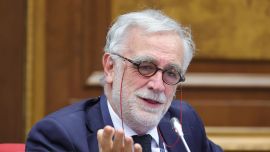With Donald Trump out of the White House, it seems as if a majority of the world is relieved, even exuberant about the possibility of a sense of normalcy in the United States. That definitely seems to be the situation within the Alberto Fernández administration in Argentina, with the president writing a heart-felt letter to Joe Biden, congratulating him on his electoral win, adding: “I know you truly know, with body and soul, the realities of Latin America.” Despite the typical internal contradictions within the ruling Frente de Todos coalition, there does seem to be much more in common between Alberto and Biden than with Trump, who seems more aligned with Mauricio Macri, yet the expectations might be misplaced, and Argentina may continue to be an insignificant actor in theUnited States’ agenda.
Not everyone in the current administration appeared overjoyed at the televised images of Biden and Kamala Harris being sworn into office. Outpacing the president, Foreign Minister Felipe Solá was one of the first Argentine officials — as the one responsible for setting foreign policy — to take to social media to congratulate Biden. From the official account of the Ministry they tweeted: “We congratulate the people of the United States, President Joseph Biden and Vice-President Kamala Harris. Argentina wishes to boost relations and see that multilateral organisms are respected, also hoping that there is no betting on the disunity of our countries, as in the previous stage.”
In Argentina it took everyone by surprise, including the president, according to reporting by Román Lejtman. It was odd to see the foreign minister’s passive aggressive tweet when the whole of the administration saw Biden’s arrival as beneficial. Solá’s repeated blunders, intentional or not, seem to put him in Fernández's crosshairs, from the consistent contradictions in Argentina’s position toward Venezuela, to his remembered comments regarding Alberto and Biden’s first phone conversation, where he wasn’t present. He was also one of the few members of the Cabinet that directly responded to Cristina Fernández de Kirchner when she noted that some of them “weren’t working” and should “find a job.” He offered: “It wouldn’t be bad to find another job. I just have no time.”
Solá aside, there’s high expectations regarding the relationship with the “new” United States, one that looks a lot more like the old US than the one Trump crafted in his single-term in office. Alberto Fernández’s letter outlines the major points in the bilateral agenda: the united front against the global coronavirus pandemic, the strengthening of social democratic values, the environmental crisis, income inequality, organised crime, and human rights. Alberto also highlights the importance of seeing the US return to “global multilateral dimensions” including the Paris Agreement and the World Health Organisation, both of which Trump had walked out on. The president signed his letter with ink, including the customary complimentary close “sinceramente” (“sincerely”), used ironically as a reference to Cristina Fernández de Kirchner’s book when writing to political adversaries such as Brazil’s Jair Bolsonaro. This time around, Alberto probably thought it was politically in tune with Biden’s ideology. Controversial.
The most important issue in the bilateral agenda at this juncture is the International Monetary Fund. Interestingly, it was Donald Trump who pushed the board to approve the Fund’s largest-ever loan for Argentina, as his appointee at the Inter-American Development Bank, Mauricio Claver-Carone, revealed. With 16.5 percent voting power in the board of governors, the US essentially has veto power over major decisions, such as the loan to the Macri administration, which was opposed by the Europeans. With former Federal Reserve chair Janet Yellen set to take the reins at the Treasury, it remains to be seen whether Economy Minister Martín Guzmán will manage to successfully restructure the US$44-billion tranche received in 2018 as part of an emergency standby agreement that Alberto and Cristina claim was used to finance Macri’s losing electoral campaign. Sergio Chodos, Southern Cone representative at the IMF board, suggested the country will be looking for a new seven to 10-year programme, potentially including fresh funds. An agreement should be reached before May, he indicated.
Sources in the Casa Rosada believe this is a “new” IMF, one that won’t impose harsh austerity measures that will derail any potential recovery at the expense of paying creditors, including the Fund. Guzmán’s whole raison d’etre is to renegotiate poor countries’ unsustainable debt, giving them a grace period to “get back on their feet,” as Fernández likes to say. But the young official also understands the need to control massive deficit and runaway monetary expansion, along with the need to cut subsidies and rationalise public utility costs. He seems to be clashing, or accepting, statist directives from the Instituto Patria, the Kirchnerite think-tank, which could make the restructuring that much harder. IMF chief Kristalina Georgieva urges countries to “spend as much as you can,” and she has a great relationship with both the minister and the president, but it remains to be seen whether she’ll be willing to accept an economic plan that seems to be more closely tied to winning the midterm elections than correcting macroeconomic imbalances.
According to Perfil’s world editor Leandro Dario, Biden’s top three priorities for Latin America include battling climate change, the socio-political crisis in Venezuela under the Nicolás Maduro regime, and China’s growing influence. While Alberto tries to show himself aligned with the environmentalist agenda, the real issue in our region is Brazil and its protection — or lack thereof — of the Amazon rainforest. Bolsonaro, who sought “carnal relations” with the US under Trump, will have to change his strategy if he’s looking to continue on good terms with the global superpower. With regards to Venezuela, Biden’s incoming Secretary of State Antony Blinken has already labelled Maduro a “brutal dictator,” a concept echoed by the new president himself during the campaign. That position clashes with Argentina’s alignment with Mexico and Uruguay, which recognise Maduro’s government and are pushing for Venezuelans to domestically resolve their issues. And finally, China: Alberto and Premier Xi Jinping have exchanged letters this January and Beijing has already become Argentina’s largest trading partner. Tough to see us turning our backs on China at this juncture.
Trump, with his personal relationships and unorthodox diplomatic style, seems to have helped Mauricio out, supposedly to the benefit of the nation. During the Obama years, Cristina sought desperately to get her picture taken with him during international summits, but Argentina was unimportant in the agenda, with the exception of the brutal showdown between the “vulture” Paul Singer in Judge Thomas Griesa’s courtroom in New York. Biden has a lot on his plate, with a fractured nation, Covid-19 spiralling out of control and an economy that is losing its edge in the geopolitical battle with China. We are pretty low in the list of priorities, as we’ve been for a while.
One actor could tilt the scales, though: Pope Francis. Biden is the second Catholic president of the US, preceded by John F. Kennedy. How much will the Peronist leader of the Holy See nudge Biden our way? God only knows.























Comments